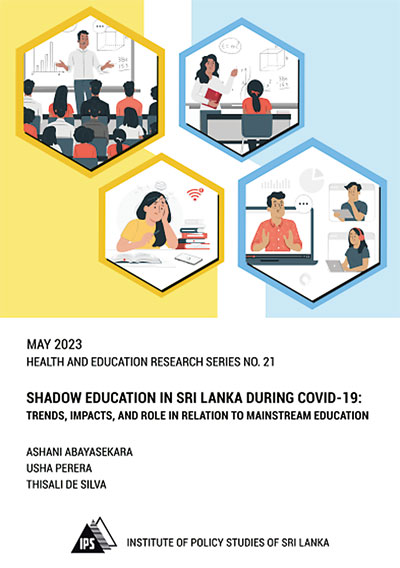New IPS Publication Finds COVID-19 Pandemic Increased Importance of Private Supplementary Tutoring in Sri Lanka, but Access and Quality Remain Issues
View(s):n A new IPS study finds that the demand for private tutoring in Sri Lanka increased in the context of dysfunctional school classes due to the pandemic and teacher strikes.
- The study highlights a strong association between household income and the quality of online shadow education.
- Poor connectivity, high data costs, and lack of devices hindered access to online tuition during the pandemic.
- Despite such issues, online shadow education has become more accessible than mainstream education, allowing for greater flexibility, and increasing the industry’s importance in the education sector.
A new study conducted by the Institute of Policy Studies of Sri Lanka (IPS) finds that the demand for private tutoring has increased in the context of dysfunctional school classes due to the pandemic and teacher strikes. The study titled ‘Shadow Education in Sri Lanka during COVID-19: Trends, Impacts, and Role in Relation to Mainstream Education’ is authored by Ashani Abayasekara, Usha Perera, and Thisali de Silva.
The COVID-19 pandemic caused significant disruption to education systems worldwide. While there has been considerable research on the impact of extended school closures on formal mainstream education, private supplementary tutoring or “shadow education” has received minimal attention despite its growing popularity. Against such a backdrop, this new IPS study identifies issues related to the accessibility, quality, and affordability of private tutoring, particularly in the context of the pandemic.

Based on primary data obtained from several sources, including an online survey of O/L and A/L students, telephone interviews conducted with students in rural locations; Key Informant Interviews conducted with a sample of teachers and tutors, and analysis of online tuition advertisements, the study finds that household income is strongly associated with the quality of online shadow education. Most students faced accessibility issues for online tuition classes during the pandemic due to poor connectivity, high data costs, lack of necessary devices, and affordability concerns amidst the loss of household income. The study notes that while tuition advertisements in Sri Lanka are concentrated in the affluent Western Province, accessibility to shadow education increased vis-à-vis mainstream education, owing to greater flexibility in scheduling online classes and the ability to join any class of choice regardless of location. Furthermore, overloaded schedules, financial motives, attitudinal issues and overdependence on tuition were identified as drawbacks of the tuition industry, while respondents highlighted the importance of nurturing non-academic skills and protecting education equity by virtue of free education.
Based on the findings, the study proposes the following policy recommendations to education policymakers in improving the quality, accessibility, and equitability of shadow education in general.
- Improving Quality: To improve the industry’s quality, obtaining comprehensive data, monitoring and regulating the industry, and investing in online pedagogical expertise are crucial.
- Improving Accessibility: In terms of improving accessibility, providing devices and networks for given locations, such as schools and tuition centres, in line with student needs and improving communication platforms between schools, parents, and students is essential.
- Improving Equity and Affordability: To address equity and affordability concerns, better collaboration between the government and the shadow education industry under a policy that encourages shadow education as a key facilitator to mainstream education can be considered. This could be implemented along with the provision of subsidies or tax deductions for lower-income students to attend tuition classes.
The study contends that while private tutoring has a significant role in Sri Lanka’s education system, addressing the issues related to its accessibility, quality, and affordability is essential to ensure that all students have an equal opportunity to succeed in their education.
HitAd.lk is the best and biggest mobile phone market in Sri Lanka, and we guarantee you will find what you need here from our extensive listing of mobile phones for sale in Sri Lanka. Whether it’s a budget-priced smartphone for communication, or higher end features with advanced connectivity, there are many different options from which to choose from on our site!


